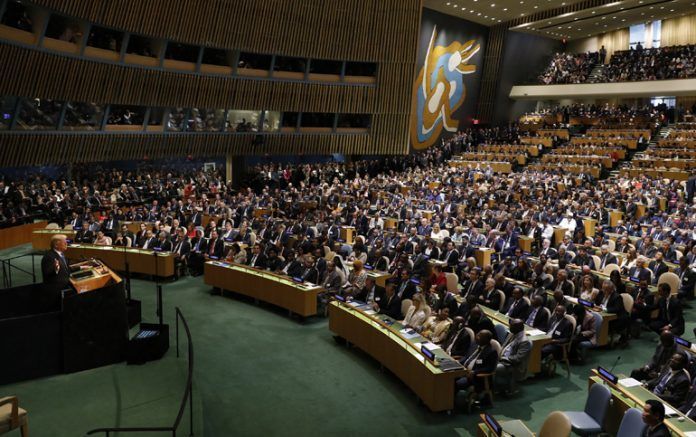
By Potkin Azarmehr
September 21, 2017 English speaking Iranians who heard US President, Donald Trump’s speech at the UN General Assembly were amused by the way it was simultaneously translated on Iran state TV news channel.
Even the Iranian MP, Mahmoud Sadeghi tweeted :
“Poor State TV News channel’s simultaneous interpreter for Trump’s trash speech! How he struggled to perform his duty to simultaneously distort and censor the speech”
This was not the first time Iranian state television’s translator distorted the original speech for Iranian viewers. One such infamous incident picked up by the international media was during Mohammed Morsi’s visit to Tehran in 2012. The 16th summit of the Non-Aligned Movement in 2012 was supposed to have been an opportunity for the Iranian regime to display to the people of Iran that despite the UN sanctions, the country was not isolated and had many friends. Iran was also looking forward to a new alliance with Egypt’s newly elected Muslim Brotherhood President, Mohammed Morsi. What spoiled the show was Morsi’s criticism of the Assad regime in Syria during his speech.
To save the Iranian government from embarrassment, the simultaneous interpreter replaced Morsi’s criticism of the Assad regime with the official Iranian narrative. In complete contrast to what was actually said, he translated Morsi’s criticism of the Syrian regime to, “There is a crisis in Syria and we must support the ruling regime in Syria.”

The Iranian state TV’s translation of Trump’s speech at the UN General Assembly was a distortion and at best loosely conveyed Trump’s sentiments. On many occasions the interpreter simply gave up and did not bother to translate at all.
Some of what was ‘lost in translation’ is listed below:
Trump:
“The longest suffering victims of Iran’s leaders are in fact its own people. Rather than use its resources to improve Iranian lives, its oil profits go to fund Hezbollah and other terrorists that kill innocent Muslims and attack their peaceful Arab and Israeli neighbours.”
Lost in Translation:
“The lives of Iranians can be better. It defends Hezbollah and kills its own kind.”
Trump:
“This wealth, which rightly belongs to Iran’s people, also goes to shore up Bashar al-Assad’s dictatorship, fuel Yemen’s civil war and undermine peace throughout the entire Middle East.
Lost in Translation:
“This vote completely depends on the nations. We believe Iran has a hand in Yemen and somehow directs the war.”
Trump:
“We cannot let a murderous regime continue these destabilising activities while building dangerous missiles, and we cannot abide by an agreement if it provides cover for the eventual construction of a nuclear program.”
Lost in Translation:
“We can not allow such activities to continue and to continue building its missiles and we will not commit to such an agreement that provides a cover and to build a nuclear weapon.”
Trump:
“The Iran deal was one of the worst and most one-sided transactions the United States has ever entered into.”
Lost in Translation:
“One of the worst agreements I have ever seen was the Iran agreement.”
Trump:
“The entire world understands that the good people of Iran want change and, other than the vast military power of the United States, that Iran’s people are what their leaders fear the most. This is what causes the regime to restrict internet access, tear down satellite dishes, shoot unarmed student protesters and imprison political reformists.”
Lost in Translation:
“The US army is a strong army and the people of Iran are a strong nation… a lot happens in Iran which is unacceptable for us.”
Trump:
“Oppressive regimes cannot endure forever, and the day will come when the people will face a choice. Will they continue down the path of poverty, bloodshed and terror, or will the Iranian people return to the nation’s proud roots as a centre of civilization, culture and wealth, where their people can be happy and prosperous once again?”
Lost in Translation:
“Regimes that oppress their people must be confronted with. We think all of Iranian people can return to becoming the centre of culture, be centre of wealth… a place where they will be happy”
“Lost in Translation” has been the effective tool of domestic and foreign policy by the regime in Iran. Take for example the case of chants of “Death to America” or “Israel must be wiped off the map.“ Iranian officials and their lobby groups analyse these for Western media anchors as simple criticism of US foreign policies and opposition to Zionism. Whether simultaneous or not, translation is seen by Iranian authorities and their lobby groups as a tool for domestic and foreign “duplicity.”


